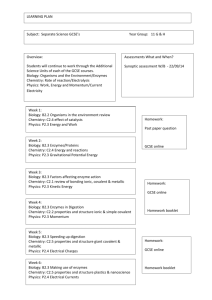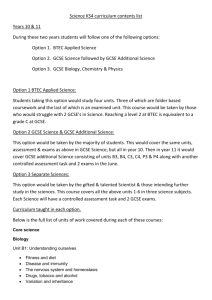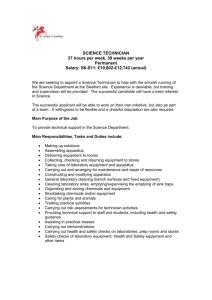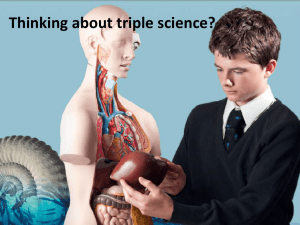GCSE Science Course assessment from Sept 2011
advertisement
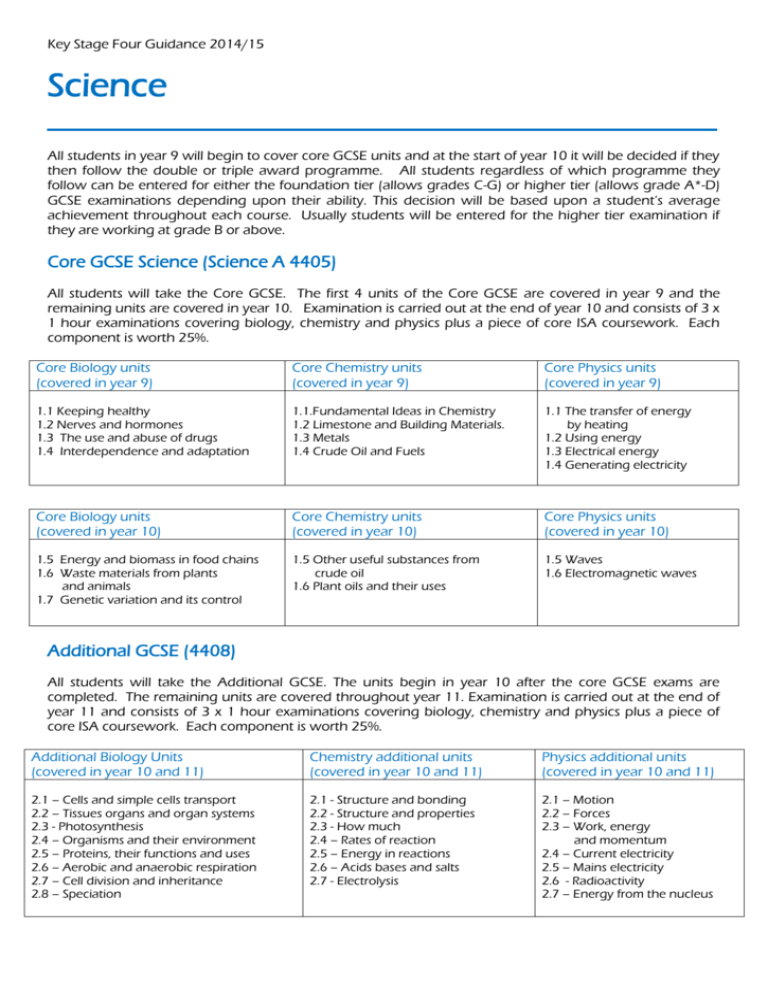
Key Stage Four Guidance 2014/15 Science _______________________________________________ All students in year 9 will begin to cover core GCSE units and at the start of year 10 it will be decided if they then follow the double or triple award programme. All students regardless of which programme they follow can be entered for either the foundation tier (allows grades C-G) or higher tier (allows grade A*-D) GCSE examinations depending upon their ability. This decision will be based upon a student’s average achievement throughout each course. Usually students will be entered for the higher tier examination if they are working at grade B or above. Core GCSE Science (Science A 4405) All students will take the Core GCSE. The first 4 units of the Core GCSE are covered in year 9 and the remaining units are covered in year 10. Examination is carried out at the end of year 10 and consists of 3 x 1 hour examinations covering biology, chemistry and physics plus a piece of core ISA coursework. Each component is worth 25%. Core Biology units (covered in year 9) Core Chemistry units (covered in year 9) Core Physics units (covered in year 9) 1.1 Keeping healthy 1.2 Nerves and hormones 1.3 The use and abuse of drugs 1.4 Interdependence and adaptation 1.1.Fundamental Ideas in Chemistry 1.2 Limestone and Building Materials. 1.3 Metals 1.4 Crude Oil and Fuels 1.1 The transfer of energy by heating 1.2 Using energy 1.3 Electrical energy 1.4 Generating electricity Core Biology units (covered in year 10) Core Chemistry units (covered in year 10) Core Physics units (covered in year 10) 1.5 Energy and biomass in food chains 1.6 Waste materials from plants and animals 1.7 Genetic variation and its control 1.5 Other useful substances from crude oil 1.6 Plant oils and their uses 1.5 Waves 1.6 Electromagnetic waves Additional GCSE (4408) All students will take the Additional GCSE. The units begin in year 10 after the core GCSE exams are completed. The remaining units are covered throughout year 11. Examination is carried out at the end of year 11 and consists of 3 x 1 hour examinations covering biology, chemistry and physics plus a piece of core ISA coursework. Each component is worth 25%. Additional Biology Units (covered in year 10 and 11) Chemistry additional units (covered in year 10 and 11) Physics additional units (covered in year 10 and 11) 2.1 – Cells and simple cells transport 2.2 – Tissues organs and organ systems 2.3 - Photosynthesis 2.4 – Organisms and their environment 2.5 – Proteins, their functions and uses 2.6 – Aerobic and anaerobic respiration 2.7 – Cell division and inheritance 2.8 – Speciation 2.1 - Structure and bonding 2.2 - Structure and properties 2.3 - How much 2.4 – Rates of reaction 2.5 – Energy in reactions 2.6 – Acids bases and salts 2.7 - Electrolysis 2.1 – Motion 2.2 – Forces 2.3 – Work, energy and momentum 2.4 – Current electricity 2.5 – Mains electricity 2.6 - Radioactivity 2.7 – Energy from the nucleus Key Stage Four Guidance 2014/15 Further Additional GCSE (4410) Our most able students are selected at the beginning of year 10 to follow the Triple Award GCSE science course. Usually this is students working at a grade B or above. This allows them to obtain an extra GCSE in science called Further Additional. Students who follow this course will be working at a much faster pace as no extra lesson time is given. Examination is carried out at the end of year 11 with 3 x 1 hour exams in biology, chemistry and physics and a piece of ISA coursework. Each component is worth 25%. Further Additional Biology Units (covered in year 11) Further Additional units (covered in year 11) Chemistry Further Additional Physics units (covered in year 11) 3.1 – Exchange in materials 3.2 – Transporting materials 3.3 – Keeping internal conditions constant 3.4 – How humans can affect the environment 3.1 – The periodic table 3.2 – Water 3.3 – Energy calculations 3.4 – Analysis and synthesis 3.5 – Organic chemistry 3.1 – Medical applications of physics 3.2 – Using Physics to make things work 3.3 – Using magnetic fields to keep things moving Please view the AQA Website for more information http://web.aqa.org.uk/qual/subjectindex-c.php What do students need to do to be successful in GCSE science? Outcomes sheets will be stuck into exercise books at the beginning of each unit, these show what students need to be able to do in each unit. These should be used as a tracking document to enable them to identify which units/ topics they need to review/ revise more carefully. Attempt to complete all of the work set in class, avoid distraction and make clear notes written in full sentences so that they can be used for revision later on. Catch up any missed work due to absence as soon as possible, preferably before the next lesson. Prepare carefully for the assessed tasks which are completed mid-way through every unit. These are internally assessed tasks used to provide teachers with accurate current working grades. Revise carefully for the end of units tests which are carried out at the end of each unit, they consist of past paper GCSE examination questions. Ask for help if they are unsure of anything. Attend science drop sessions which are available after school every Tuesday and Thursday in the upper school science area from 3.30-4.20 if they need extra support.


